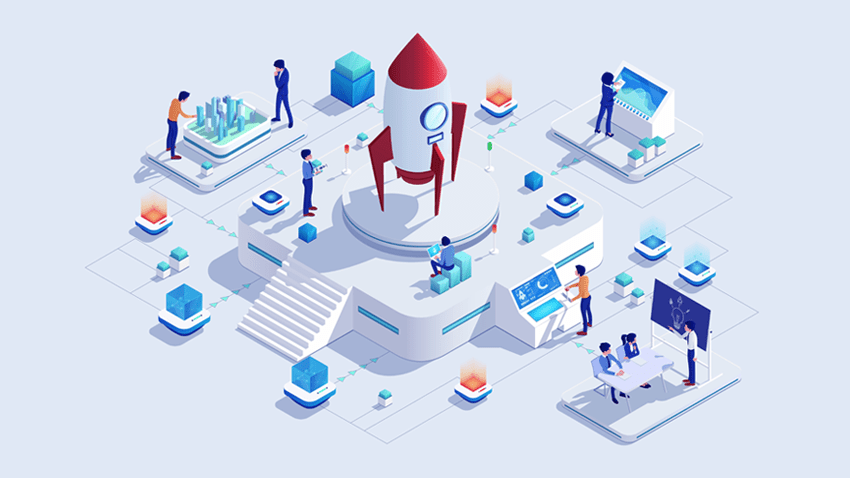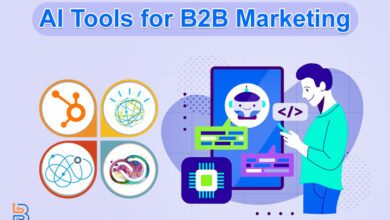
Artificial intelligence (AI) and machine learning (ML) are empowering intelligent automation (IA), which is increasingly emerging as a pivotal driver of contemporary business triumph. IA facilitates the efficient and scalable enhancement of decision-making processes throughout organizations. It streamlines operations, liberates resources, and boosts operational efficiencies, with applications spanning various functions. As the reach and embrace of intelligent automation expand, we are witnessing novel business development paradigms. In this discussion, we will delve into the evolution of intelligent automation, its impact on the business landscape in 2024, and the anticipated growth of IA in the future.
The Evolution of Intelligent Automation
The history of task automation stretches across human civilization, tracing its roots back to the early Mayan automation of water transportation. Throughout history, people have devised systems to alleviate the burden of repetitive tasks. With the advent of technology in the nineteenth century, automation ushered in quicker and more efficient methods for carrying out business operations. In our modern era, integrating AI and ML has given rise to a new generation of automation, commonly called intelligent automation. AI tools make their presence felt in various sectors, including HR, finance, and virtually every industry. This potent combination signifies a paradigm shift, empowering businesses to streamline their operations, make data-driven decisions, and optimize efficiency to an unprecedented degree.
Benefits of Intelligent automation in Businesses
The integration of automation in the workplace has provided businesses and their employees with the opportunity to delegate laborious and time-consuming tasks, enabling employees not only to complete their work more quickly but also to redirect their attention towards more strategic and high-impact endeavors aimed at enhancing business results. Let’s explore the diverse advantages of intelligent automation for businesses:
Improved Efficiency
Intelligent automation liberates the workforce from repetitive yet essential tasks, allowing them to concentrate on strategic initiatives that significantly contribute to improving business outcomes. While manual paperwork and reporting remain vital to business operations, intelligent automation is pivotal in diminishing the time and human resources needed. This heightened efficiency speeds up processes and cultivates a culture of innovation and creativity among employees.
Cost Saving
Intelligent automation reduces the dependency on manual labor and optimizes workflows, leading to substantial cost reductions. This doesn’t necessarily imply a reduction in available jobs but rather allows businesses to concentrate on recruiting and engaging individuals in more high-skilled positions while delegating less skilled tasks to automation. With these resources efficiently managed, businesses can redeploy their workforce to high-value tasks that propel business growth and innovation.
Enhanced Accuracy and Reduced Errors
AI-driven automation minimizes the margin for human errors that frequently occur in manual processes. By guaranteeing precise and uniform outcomes throughout all operations, intelligent automation significantly mitigates the chances of human errors, thereby enhancing the efficiency of businesses and preventing errors from compounding through early detection. This heightened accuracy results in elevated customer satisfaction and enhanced credibility for the business.
How Intelligent Automation is Transforming Businesses Processes
Harnessing automation offers numerous advantages, including streamlined processes, the delegation of administrative tasks, and the assurance of precise data. With the integration of IA into business operations, we’ve observed a comprehensive transformation across various aspects of business, ranging from immediate customer support to optimizing supply chains:

Customer Service
Intelligent Automation has revolutionized customer service by deploying chatbots and virtual assistants that effectively manage customer queries and support requests around the clock. These AI-driven bots can comprehend natural language, deliver instantaneous responses, and furnish tailored solutions by drawing from customer data. This automation has not only enhanced response times but also lightened the workload of human agents, enabling them to concentrate on more intricate customer issues.
Financial Operation
Financial processes have experienced a significant increase in productivity and efficiency by automating tasks such as invoice processing, accounts payable and receivable, and reconciliation. With machine learning algorithms, IA systems can precisely categorize and extract data from invoices, diminishing manual errors and expediting the entire financial workflow. Additionally, IA is crucial in detecting fraud and monitoring compliance to ensure financial operations align with regulations.
Read Also: The Role of Technology in Modernizing Courier Services for Businesses
Human Resources
Human resources predominantly involves human expertise, yet intelligent automation has significantly streamlined several manual processes to enhance functions like recruitment. This includes candidate sourcing, resume screening, and employee onboarding. AI-driven tools can scan resumes for pertinent skills and experience, create shortlists of candidates, and even conduct initial interviews. This saves HR teams substantial time but also aids in identifying the most promising candidates for business growth.
Supply Chain and Inventory Management
IA has significantly improved supply chain and inventory management by enabling businesses to anticipate demand, automate order processing, and efficiently control inventory, reducing waste and increasing profits. Machine learning algorithms can analyze historical data to forecast future demand, allowing businesses to maintain ideal stock levels and lower carrying costs. Furthermore, Intelligent Automation supports real-time shipment tracking, guaranteeing punctual deliveries, streamlined logistics, and an enhanced customer experience.
The Future of Intelligent Automation
We’ve witnessed the transformative impact of IA on business thus far, but a wealth of potential is yet to be explored. Let’s delve into what the future holds for intelligent automation:
Advancements in AI and Automation Technologies
As technology advances, we anticipate AI and automation becoming increasingly sophisticated, offering more extensive solutions and unlocking fresh potential for business operations. This includes AI-driven personalization, which customizes products, services, and marketing messages based on individual preferences, and the advent of autonomous vehicles and delivery drones. The scope of IA’s transformative impact on how business is conducted knows no bounds.
Preparing for The Next Phase of Intelligent Automation
As intelligent automation molds the future, staying abreast of the most recent trends and technologies becomes crucial. Business leaders must allocate resources to training and development to harness the complete potential of intelligent automation. Moreover, it is essential to cultivate a culture of innovation and wholeheartedly welcome change to incorporate intelligent automation into business operations seamlessly. Organizations should actively promote collaboration between human employees and automated systems to establish synergistic workflows and enhance productivity.
New Era of AI Disciplines
As increasingly advanced IA business solutions come to the forefront, we can anticipate the dawn of a new era in AI-related disciplines. It’s foreseeable that graduates from higher education institutions will possess specialized degrees centered on artificial intelligence and automation. Entire job roles and departments will be structured around the utilization and administration of IA for businesses.
Conclusion
In 2024, intelligent automation is poised to be pivotal in reshaping businesses. With its ability to streamline processes, enhance efficiency, and facilitate innovative solutions, it promises to redefine how organizations operate and engage with their customers. The continued evolution of AI-driven automation, coupled with a commitment to fostering a culture of adaptation and learning, will be key to unlocking the full potential of this transformative technology in the years to come.






